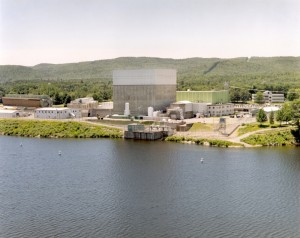
Vermont Yankee, on the Connecticut River
The Vermont Senate voted 26 to 4 to close Vermont Yankee. While proponents of nuclear power claim that the plants can be run safely and economically, Entergy, the Louisiana company that operates the plant, is now known to be running Vermont Yankee AT A LOSS!
Economics is not the issue. The Vermont Senate isn’t interested in the profitability of an enterprise. What is at issue is whether Vermont Yankee can be operated safely and whether Entergy can be trusted to operate Vermont Yankee safely. By a vote of 26 to 4, the Vermont Senate answered those questions with a resounding “NO!”
An Entergy Executive responsible for Vermont Yankee testified under oath to two state panels that there were no buried pipes at Vermont Yankee that could leak tritium. This testimony is now known to be false. The Entergy executive has been relieved of his responsibilities. (Click here.) According to NPR (here) “Entergy Nuclear chief executive J. Wayne Leonard did not identify the official by name. But he described the executive relieved of his duties in a way that could only apply to Vice President Jay Thayer.
State Senator Peter Shumlin, Democrat, Wyndham, asked “What’s worse, a company that won’t tell you the truth or a company’s that’s operating your aging nuclear power plant on the banks of the Connecticut River and doesn’t know that they have pipes with radioactive water running through them that are leaking? And they don’t know because they didn’t know the pipes existed. Neither is very comforting.”
Vermont State Senator Randolph Brock, Republican, St. Albans, who in the past has supported Vermont Yankee, said “If the board of directors and management of Entergy were thoroughly infiltrated by antinuclear activists, I do not think they could have done a better job of destroying their own case.”
Entergy claims that no tritium has turned up in drinking water, but that claim must be verified. The Connecticut River, which flows past Vermont Yankee, probably should be checked for Tritium.
Officials at Entergy, the Louisiana company that owns Vermont Yankee, are trying to sell Vermont Yankee, Indian Point, and three other nuclear power stations in the north-east.
It is a similar design to the Oyster Creek nuclear power station, in New Jersey, operated by Exelon, which is also known to be leaking tritium.
Michael Wald covered the story for The New York Times. Guy Raz covered the story at NPR.


